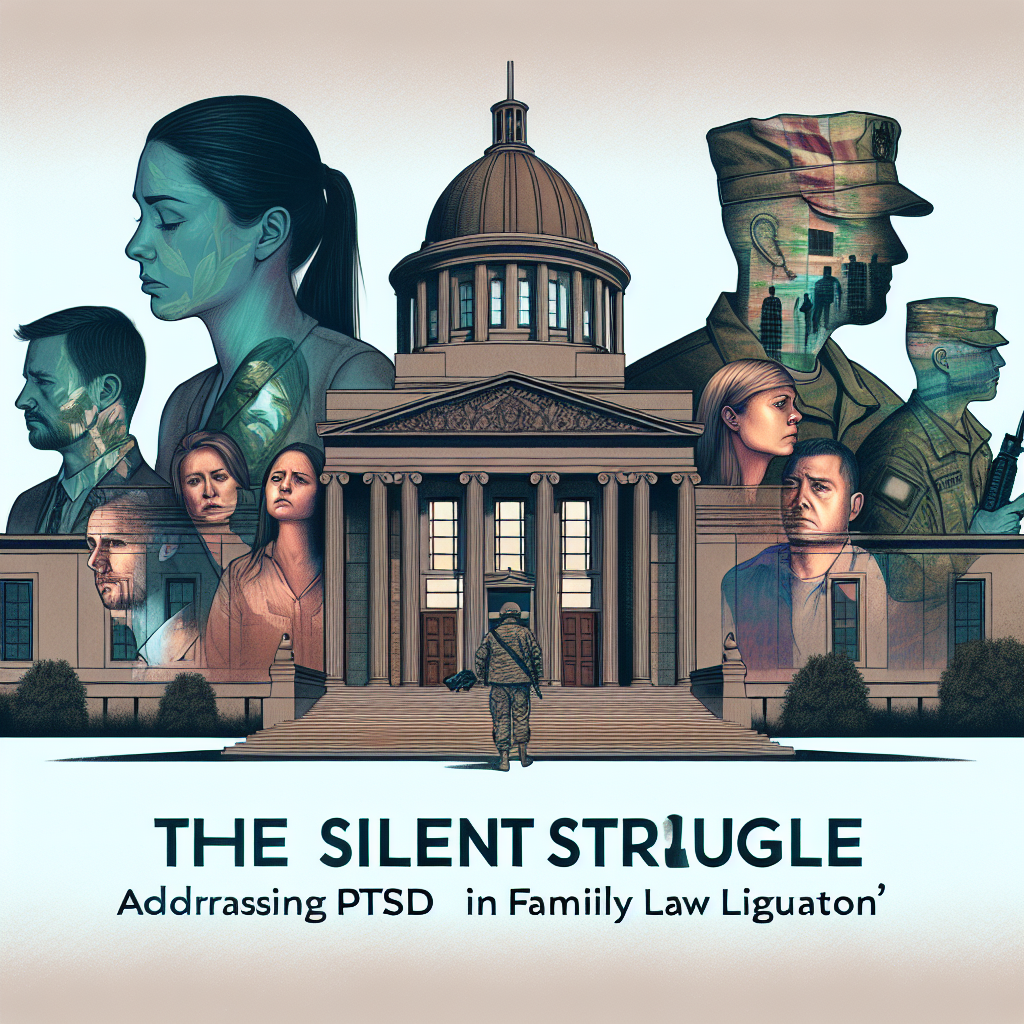
Introduction
Picture a courtroom. Tension fills the air as families are torn apart, and emotions run high. For those navigating the waters of family law, the struggle isn’t always just legal; it’s deeply personal, often intertwined with mental health challenges like Post-Traumatic Stress Disorder (PTSD). The Silent Struggle: Addressing PTSD in Family Law Litigation isn’t just another topic to explore—it’s a crucial conversation we must have. Understanding how PTSD affects those involved in family law litigation is essential for creating a more compassionate legal environment.
In this article, we will delve into the complex interplay between PTSD and family law litigation, offering insights, real-world applications, and strategies for support that can aid both legal practitioners and affected families alike.
Understanding PTSD and Its Implications
What is PTSD?
PTSD is a mental health condition triggered by witnessing or experiencing a traumatic event. While commonly associated with veterans of war or victims of violence, PTSD can affect anyone, including individuals involved in family law disputes—be it through domestic violence, child custody battles, or the emotional toll of divorce.
The Link Between PTSD and Family Law
Family law disputes often arise from traumatic experiences. For instance, survivors of domestic violence may face PTSD that complicates their ability to navigate the legal system. The ramifications of such trauma can lead to irrational decision-making, increased anxiety, and even difficulties in articulating one’s needs within the courtroom setting. Recognizing The Silent Struggle: Addressing PTSD in Family Law Litigation is vital, as it can significantly impact the outcomes for both parties involved.
Statistics on PTSD in Family Law Contexts
To understand the breadth of this issue, consider the following statistics:
| Statistic | Percentage (%) |
|---|---|
| Prevalence of PTSD in domestic violence survivors | 31% |
| Percentage of children affected by parental PTSD | 25% |
| Increase in anxiety during court proceedings | 70% |
These statistics emphasize the need for empathy and strategies to accommodate affected individuals in family law litigation.
The Impact of PTSD on Legal Proceedings
Emotional Challenges
For those struggling with PTSD, attending court can be a harrowing experience. Symptoms such as flashbacks, heightened anxiety, and emotional numbness can significantly affect a person’s capacity to articulate their thoughts or make decisions.
Case Study: Sarah’s Story
Sarah, a survivor of domestic abuse, sought a protective order against her ex-partner. But as she sat in the courtroom, the mere sight of her abuser triggered a panic attack. Sarah’s experience illustrates how PTSD can inhibit an individual’s ability to advocate for themselves during family law litigation.
Analysis
Sarah’s story underscores the importance of recognizing PTSD’s influence in court. Providing accommodations, like allowing for off-site testimonies or the use of support animals, can create a more favorable environment for victims to share their truth.
Behavioral Implications
Those with PTSD may exhibit disruptive behaviors stemming from their trauma. In high-stress environments like the courtroom, these behaviors can be exacerbated, thus affecting the case’s outcome.
Case Study: Tom’s Custody Battle
Tom, a father facing a custody battle while managing PTSD from a traumatic childhood, struggled to present his case. His symptoms led to uncharacteristic outbursts, which clouded his judgment in the eyes of the judge.
Analysis
Tom’s experience highlights the potential bias that can arise from misunderstandings about PTSD. Legal professionals should receive training to recognize these behavioral manifestations so they don’t unduly influence decisions regarding custody and other significant matters.
Strategies for Addressing PTSD in Family Law
Training for Legal Professionals
Understanding Trauma-Informed Care
Legal professionals should be trained in trauma-informed care, understanding the nuances of PTSD and how it manifests in different individuals. This allows for a more compassionate approach when handling cases involving trauma.
Accommodations in Court
Practical Strategies
- Flexible Scheduling: Recognizing the need for safe spaces, courts can provide scheduling alternatives.
- Support Animals: Allowing therapy animals can serve as a soothing presence.
- Closed Hearings: In sensitive cases, closed hearings can reduce stress and encourage candor.
Support Systems
Mental Health Resources
Encouraging individuals involved in family law litigation to seek mental health support can be incredibly beneficial. Establishing partnerships with local mental health services to provide accessible therapy options can help alleviate the struggles associated with PTSD.
Community Awareness
Initiatives focused on educating the public about PTSD can foster empathy and understanding. Raising awareness within communities can promote support networks and validate the experiences of those affected by trauma.
Conclusion
The Silent Struggle: Addressing PTSD in Family Law Litigation is an important topic that deserves more attention in today’s legal world. By acknowledging the impact of PTSD and implementing strategies that cater to those affected, we can create a more compassionate legal system that prioritizes mental health alongside justice. Legal practitioners hold the power to affect change—not only in the courtroom but in the lives of those they serve.
By advocating for trauma-informed practices and supporting mental health initiatives, we take significant strides towards healing in the wake of trauma, transforming the landscape of family law litigation for the better.
FAQs
1. What is PTSD?
Post-Traumatic Stress Disorder (PTSD) is a mental health condition triggered by experiencing or witnessing a traumatic event.
2. How does PTSD affect individuals in family law litigation?
PTSD can result in emotional challenges, heightened anxiety, and difficulties in decision-making, impacting one’s ability to navigate legal proceedings effectively.
3. What accommodations can be made for individuals with PTSD in court?
Accommodations can include flexible scheduling, the presence of support animals, and closed hearings to provide a safer environment for victims.
4. How can legal professionals better support clients with PTSD?
By receiving training in trauma-informed care and recognizing the symptoms of PTSD, legal professionals can provide a more compassionate approach to cases involving trauma.
5. Are there mental health resources available for individuals involved in family law disputes?
Many communities offer mental health services tailored to trauma survivors, and legal professionals should encourage clients to seek these vital resources for support.
In addressing The Silent Struggle: Addressing PTSD in Family Law Litigation, we unlock the potential for change—not just within our legal framework, but within the very heart of our communities. By fostering understanding and empathy, we can contribute to healing, one case at a time.















